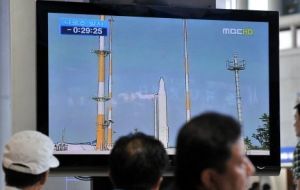MercoPress. South Atlantic News Agency
South Korea launched its first space rocket with “partial success”
 Millions of South Koreans watched the launch, but it is being viewed with suspicion by North Korea. Photo AFP
Millions of South Koreans watched the launch, but it is being viewed with suspicion by North Korea. Photo AFP South Korea has launched its first space rocket, though a scientific satellite it was carrying failed to enter into its proper orbit. South Korean officials described the launch as a “partial success”.
“All aspects of the launch were normal, but the satellite exceeded its planned orbit and reached an altitude of 360 kilometers,” said Ahn Byung-man, the minister of science and technology. The satellite should have separated at about 302 kilometers, according to South Korea's Yonhap news agency.
The cause of the failure was not immediately known. Korean experts were working with Russian scientists, who provided the technology for launch, to determine the reason, Ahn said.
Millions of South Koreans watched the launch, but it is being viewed with suspicion by North Korea.
The North was recently subjected to UN sanctions for its own rocket launch, which was widely regarded as a cover for a long-range missile test.
No North Korean satellite has been detected in space, although Pyongyang insists its rocket launch worked and the device is now orbiting the earth transmitting revolutionary melodies.
South Korea's two-stage Naro rocket lifted off on Tuesday from an island off the south coast.
The rocket - 33m long and weighing some 140 tons - was the country's half-a-billion dollar bid to join the exclusive club of space-faring nations.
Its Russian liquid-fuelled first-stage was said to produce 1,700 kilonewtons of thrust at launch.
The second stage, burning a solid fuel, was produced by South Korean engineers.
It was intended to generate 80kN of thrust and to place the Earth observation satellite into its final orbit just a few hundred kilometres above the planet.
South Korea has previously sent 10 satellites into space using launch vehicles from other countries.
It initially planned to launch the rocket in late July, but delayed it several times due to technical problems.
Seoul has rejected any comparison with Pyongyang's rocket launch and says its rocket is part of a peaceful civilian space programme.
But some security analysts have suggested that a commercial space programme could still alter the long-term strategic balance in North East Asia, as all rocket technology has potential military uses.
South Korean officials plan another rocket launch in April. The long-term goal is to create an unmanned space probe that can reach the moon by 2025, the Yonhap agency reported.




Top Comments
Disclaimer & comment rulesCommenting for this story is now closed.
If you have a Facebook account, become a fan and comment on our Facebook Page!